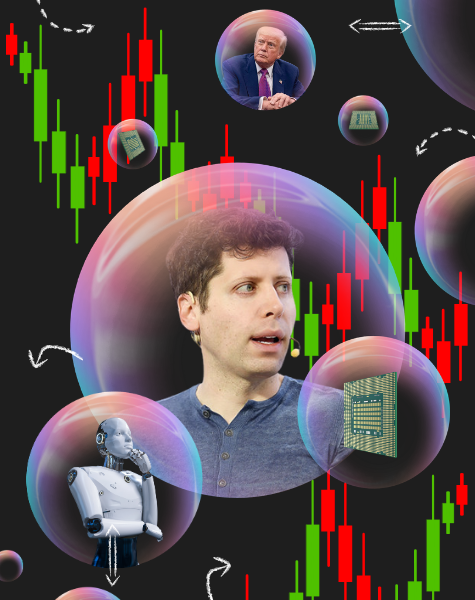
For the past year, investments in artificial intelligence—fueled by the promise that it will radically increase efficiency across most sectors—have helped prop up an economy pummeled by inflation, higher interest rates, and uncertainty around tariffs. But many now fear the AI bubble could soon burst, taking the entire U.S. economy down with it.
The expected efficiency gains, by and large, have yet to materialize. While nearly 80 percent of companies say they have started to use generative AI, just as many have reported “no significant bottom-line impact,” according to a recent McKinsey survey. A report from the Massachusetts Institute of Technology found that 95 percent of organizations saw zero return on their investments in AI, according to The Hill.
Facing such uncertain ROI, both OpenAI and Anthropic have offered their programs to federal agencies for just $1.
Nevertheless, investment into AI by Silicon Valley firms continues to accelerate. Amazon, Meta, Microsoft, and Google alone are projected to invest more than $360 billion this year into data centers, semiconductor chips, and AI research, an increase from the $325 billion projected earlier in the year, according to Yahoo Finance.
But some cracks are starting to emerge. After a record breaking spending spree to hire top AI talent, Meta announced it will freeze both external hiring and internal movement within its AI division, The Wall Street Journal reported. Meanwhile fears of the AI bubble bursting may have caused a sudden rush to sell off tech stocks.
Just last week, OpenAI CEO Sam Altman warned The Verge that we are in the midst of an AI bubble, although he remains bullish about the technology’s potential.
“Are we in a phase where investors as a whole are overexcited about AI? My opinion is yes,” Altman said. “Is AI the most important thing to happen in a very long time? My opinion is also yes.”
Economic bubbles are nothing new, especially in the tech sector. Amid the boom years of the late 1990s, investors started pouring massive amounts of money into new internet companies, believing they would always increase in value. At its peak in March 2000, the Nasdaq was valued at 5,048 units. By October 2022, it was worth only 1,139 units, a drop in value of 77 percent.
Out of the wreckage came companies like Google and Amazon, which have defined modern life in many ways. When the AI bubble eventually bursts, some companies with good fundamental products will likely survive while others crumble.
But the risk to the entire economy may be hard to overcome.
Silicon Valley AI investments have already accounted for more than half of the 1.2 percent increase in gross domestic product this year, a trend that Jens Nordvig, an economist and founder of economic-data platform Exante Data, predicts will continue for the rest of the year.
Current GDP growth is sluggish, and the job market seems to be in trouble too. The U.S. economy added only 73,000 jobs in July, while estimates for combined job growth in May and June were revised down by the Bureau of Labor Statistics from 291,000 jobs to just 33,000 jobs.
Aside from AI, the economy shows signs of a potential recession. If the AI bubble bursts soon, the question will be how long and how bad that recession could be.
—Philip Athey

Chip trade wars
Top chip trade wars takeaways:
- The Trump administration allowed Nvidia to sell its H20 AI chip to the Chinese market in exchange for 15 percent of all profits, raising security concerns in both countries.
- In America, lawmakers and national security experts warned the chip could allow the Chinese AI industry to outpace their American competitors.
- In China, the government feared the U.S. government might have installed spyware into the chips, or possibly just hoped to get the Chinese market reliant on American technology in order to halt exports at a more critical time.
- In light of those security concerns, the Chinese government moved to block imports of the H20 chip, which has reportedly caused Nvidia to halt production.
Trump’s China deal on Nvidia, AMD AI chips prompts security concerns: The president reversed his earlier block on Nvidia and AMD AI chip sales to China, granting export licenses in exchange for 15 percent of profits. Critics say this sacrifices U.S. national security for revenue and risks boosting China’s AI and military capabilities. (The Hill)
U.S. explores location trackers for AI chips, official says: Government officials may embed location‑tracking into export‑controlled AI chips to prevent unauthorized export or smuggling, a move supported by bipartisan legislation like the Chip Security Act. (Bloomberg)

